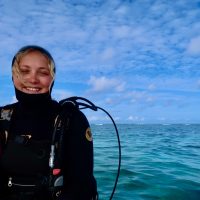Magena Marzonie
PhD Candidate
• MSc, James Cook University (2018)
James Cook University

From 2005 to 2022, the main node of the ARC Centre of Excellence for Coral Reef Studies was headquartered at James Cook University in Townsville, Queensland (Australia)








PhD Candidate
• MSc, James Cook University (2018)
James Cook University
Magena was born and raised in the landlocked state of Colorado and graduated with a BSc in biology at Fort Lewis College in 2012. Her interest for coral reef biology was sparked by family scuba trips to the Caribbean, subsequently leading her to enrol in a MSc at James Cook University. Upon finishing her degree, she worked at the Australian Institute of Marine Science for one year as a research technician on Assisted Gene Flow in corals to aid in restoration efforts.
Magena has just started a collaborative PhD with the Centre of Excellence, JCU and AIMS on genome wide assessment of heat tolerance in corals. She aims to answer knowledge gaps pertaining to local adaptation of corals, specifically investigating the genetic mechanisms that are linked to bleaching responses. This will involve acute heat stress experiments in the Coral Sea and GBR to identify corals of high and low heat stress tolerance, combined with genetic lab work to understand the responsible genetic framework.
New DNA techniques are being used to understand how coral reacted to the end of the last ice age in order to better predict how they will cope with current changes to the climate. James Cook Univer
A new study on the effects of climate change in five tropical countries has found fisheries are in more trouble than agriculture, and poor people are in the most danger. Distinguished Profess
James Cook University researchers have found brightly coloured fish are becoming increasingly rare as coral declines, with the phenomenon likely to get worse in the future. Christopher Hemingson, a
Researchers working with stakeholders in the Great Barrier Reef region have come up with ideas on how groups responsible for looking after the reef can operate more effectively when the next bleaching
Abstract: As marine species adapt to climate change, their heat tolerance will likely be under strong selection. Individual variation in heat tolerance and its heritability underpin the potential fo
Abstract: The Reef Ecology Lab in KAUST’s Red Sea Research Center explores many aspects of movement ecology of marine organisms, ranging from adult migrations to intergenerational larval dispersal
Abstract: Macroalgal meadows are a prominent, yet often maligned component of the tropical seascape. Our work at Ningaloo reef in WA demonstrate that canopy forming macroalgae provide habitat for ad
Abstract: Sharks are generally perceived as strong and fearsome animals. With fossils dating back at least 420 million years, sharks are not only majestic top predators but they also outlived dinosa
Abstract: Connectivity plays a vital role in many ecosystems through its effects on fundamental ecological and evolutionary processes. Its consequences for populations and metapopulations have been
Abstract: Evolution of many eukaryotic organisms is affected by interactions with microbes. Microbial symbioses can ultimately reflect host’s diet, habitat range, and even body shape. However, how
Abstract: The past few years have seen unprecedented coral bleaching and mortality on the Great Barrier Reef (GBR) but the consequences of this on biodiversity are not yet known. This talk will expl